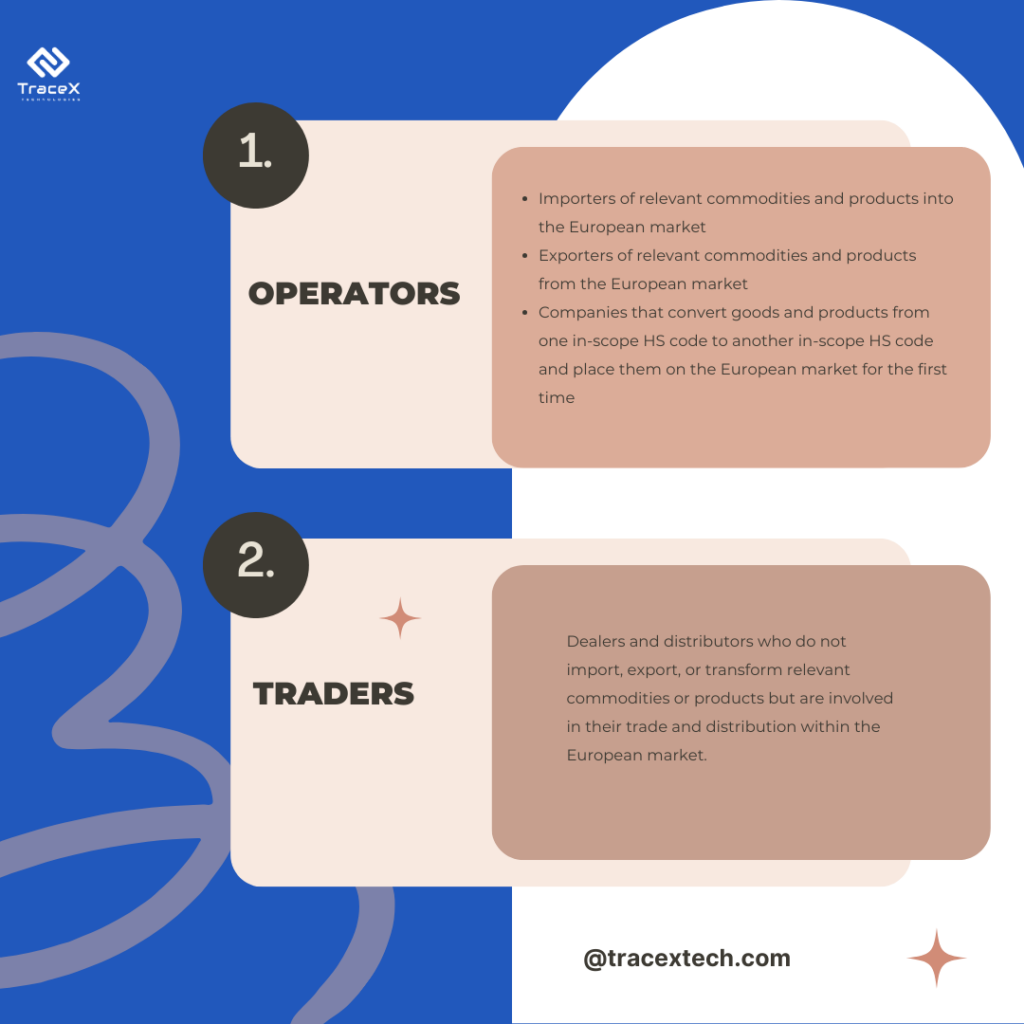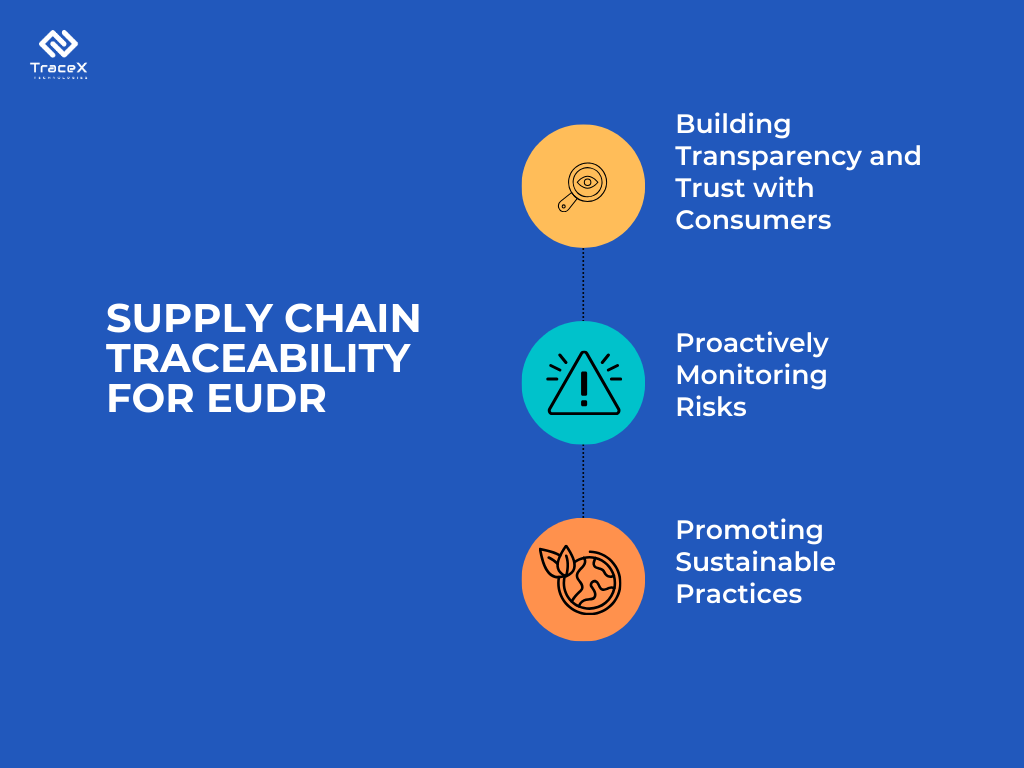Contact: +91 99725 24322 |
Menu
Menu
Quick summary: Uncertain about navigating the EUDR's complexities? This guide equips Operators & Traders with the knowledge and tools to ensure compliance and build a sustainable supply chain. Discover how traceability solutions can empower your business to thrive under the new EU Deforestation Regulation.

The European Union Deforestation Regulation (EUDR), implemented in June 2023, has transformed the playing field for businesses dealing with commodities like cattle, cocoa, and palm oil. As an Operator or Trader in this market, understanding the EUDR and its implications for your business is crucial to ensure compliance and navigate this evolving landscape. This guide is here to equip you with the knowledge and tools to confidently navigate these new regulations. We’ll explore the key challenges you might face, along with how traceability solutions can empower you to meet EUDR requirements, build a sustainable supply chain, and ultimately, thrive in this evolving landscape.
The EUDR focuses on seven key commodities – cattle, cocoa, coffee, palm oil, soya, wood, and rubber – and their derived products. It essentially mandates that these products placed on the EU market, or exported from the EU, must be demonstrably deforestation-free. This means they cannot be linked to recent deforestation (after December 31, 2020) or breaches of local environmental laws in the countries where they are produced.
The EUDR holds significant weight due to the EU’s position as a major global consumer of these commodities. By requiring deforestation-free products, the regulation aims to:
The EUDR applies to various actors within the supply chain, with specific responsibilities for Operators and Traders:

As per the EUDR official text,
Operator is
“Any natural or legal person who places on the market or exports relevant products in the course of a commercial activity”.
Let us take an example:
For example, if Company X, based in Ghana, exports cocoa butter to Europe, and Company A, based in the EU, imports it, the EUDR would consider only Company A as an operator. Additionally, if Company B, also based in the EU, uses that cocoa butter to produce chocolate and places it on the market, Company B will be considered an operator because it has created a new product with a different HS code from the original cocoa butter. Finally, Company C, based in the EU, which buys chocolate from Company B and exports it outside Europe, also qualifies as an operator.
As per the EUDR Official text,
Trader is:
“Any [natural or legal] person in the supply chain, other than the operator, who makes relevant products available on the market in the course of a commercial activity”.
Considering an example,
With respect to the cocoa companies, Company D, which buys chocolate from Operator B in the EU and distributes it to supermarket chains without transforming it, is considered a trader.
Understanding these roles and their respective responsibilities under the EUDR is the first step for Operators and Traders to navigate the new regulations effectively.
The EU Deforestation-free Regulation mandates that operators and non-SME traders must carefully examine their supply chains to ensure that the relevant commodities are not associated with deforestation, forest degradation, or illegal activities. This involves gathering necessary information, performing a risk assessment, and submitting a due diligence statement. Conversely, SME traders are only required to retain specific information about their supply chains and provide it to market operators or authorities upon request.
The EUDR presents a complex landscape for Operators and Traders, demanding a shift in sourcing practices and record-keeping.
1. Ensuring Deforestation-Free Sourcing:
2. Fulfilling Due Diligence Obligations:
3. Meeting Compliance Deadlines:
This involves collecting detailed information about the journey of your products. This data should include the geographical location where the raw materials were initially grown or harvested (e.g., farm, plantation) and the timeframe of this primary production.
Once you have gathered the supply chain data, the next step is to analyze it to assess the risk of your products being linked to deforestation, forest degradation, or illegal activities (including human rights violations). This assessment should determine whether the risk is “non-negligible” (meaning there’s a real possibility of these issues) or “negligible” (meaning the risk is very low).
– Non-negligible Risk: If the assessment identifies a non-negligible risk, you cannot simply place the products on the market. Instead, you must take steps to mitigate (reduce) these risks before they become compliant with the EUDR.
– Negligible Risk: If the assessment finds either negligible risk or no risk at all, your products are considered compliant with the EUDR and can be freely marketed.
If you identify non-negligible risks during your assessment, you need to take action to reduce them to a negligible level. This might involve:
The challenges posed by the EUDR can seem daunting, but innovative traceability solutions like TraceX can be a game-changer for Operators and Traders.
1. Traceability for Source Verification:
Traceability solutions like TraceX create a transparent map of your supply chain, allowing you to track commodities from their origin (farms, plantations) all the way to the final product on the shelf. This granular level of detail offers several benefits:
2. Streamlining Due Diligence:
Due diligence is a cornerstone of EUDR compliance, and traceability solutions can significantly simplify this process:
3. Meeting Compliance Deadlines:
The EUDR compliance deadline can feel tight, but traceability solutions can help you meet it efficiently:
By leveraging these capabilities, traceability solutions empower Operators and Traders to overcome the challenges associated with the EUDR.

The EUDR may seem like a complex hurdle, but it presents a valuable opportunity for Operators and Traders to become part of the solution for deforestation. By embracing traceability solutions like TraceX, you can navigate the EUDR maze with confidence. Traceability solutions empowers you to ensure deforestation-free products, streamline compliance efforts, and build a more sustainable future for your business and the environment.
